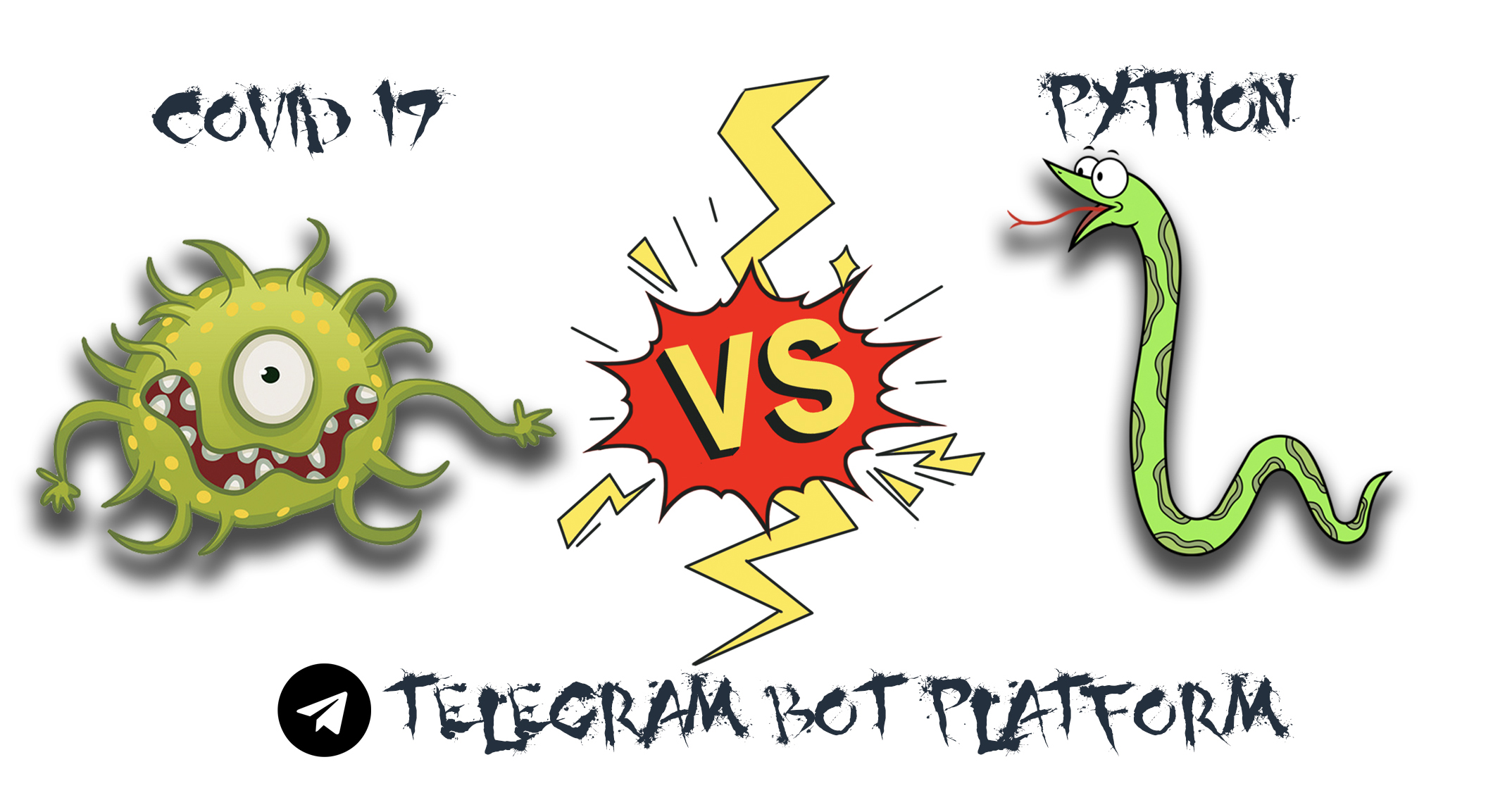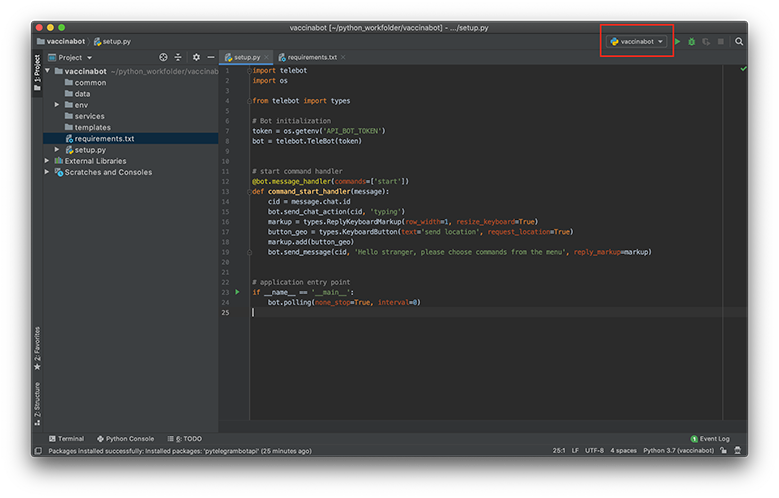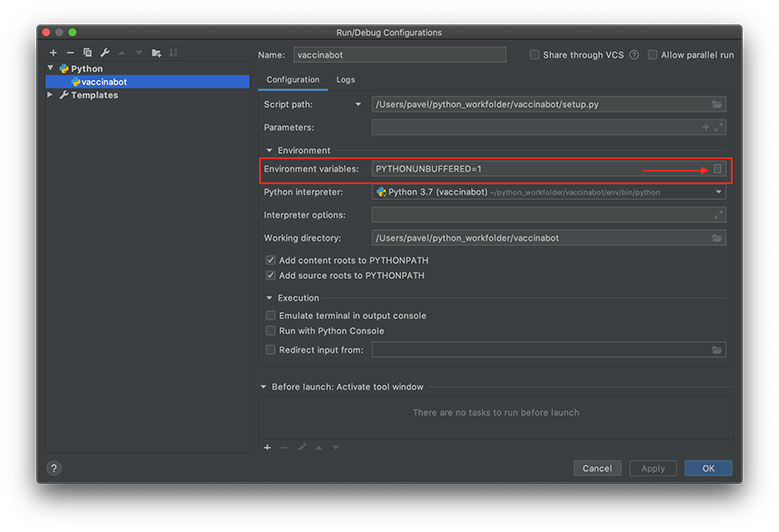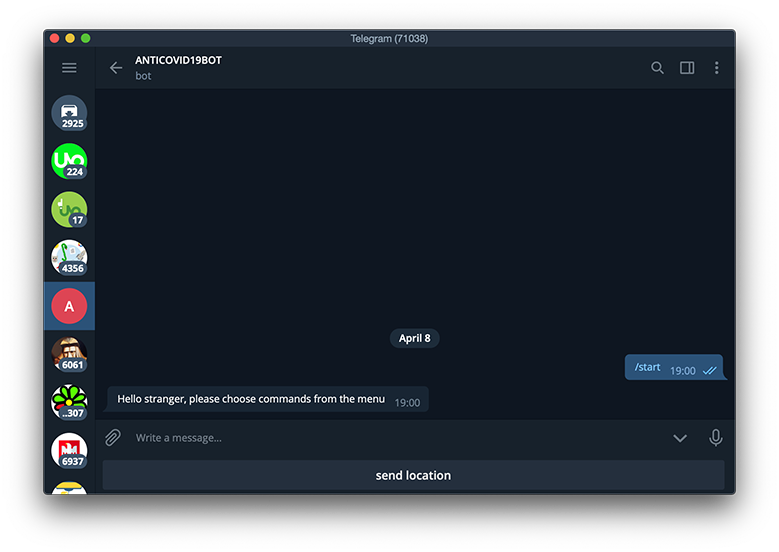
Introduction
In connection with the situation of total panic and misinformation that pours to us from absolutely all channels such as instant messengers, news sites, radio, television, it was decided to show how you can defeat coronavirus using the python bot and other interesting ingredients for Telegram ( just kidding )!
- , python, docker, heroku CLI, telegram mongoDB . , .
, , , :
-:
Telegram
Telegram . , :
- Telegram “BotFather”
- /start
- /newbot
- Telegram
- token
Telegram :
, . github , CI .
-
tree -L 2
├── Dockerfile
├── .gitignore
├── README.md
├── common
│ ├── containers.py
│ └── tg_analytics.py
├── data
│ └── mongo_context.py
├── data.csv
├── heroku.yml
├── setup.py
├── requirements.txt
├── services
│ ├── country_service.py
│ └── statistics_service.py
└── templates
├── contacts.html
├── country_statistics.html
├── himydear.html
├── idunnocommand.html
├── notfound.html
└── query_statistics.html
, :
python -m venv env
sourse env/bin/activate
( ) , , , .
- - , :
deactivate
. , .
touch requirements.txt
touch setup.py
:
- Requests — HTTP
- Pytelegrambotapi — Telegram API
- Pymongo — Mongo
- Dependency_injector —
- Geocoder — Geonames API
- Jinja2 —
- Ciso8601 — ISO 8601
- Cachetools —
- Pandas —
- Flask — web framework python
, .
requests==2.23.0
pytelegrambotapi==3.6.7
pymongo==3.10.1
dependency_injector==3.15.6
geocoder==1.38.1
jinja2==2.11.1
ciso8601==2.1.3
cachetools==4.0.0
pandas==1.0.3
flask==1.1.2
. , API, ;).
requirements.txt , :
pip install -r requirements.txt
, .
setup.py
import telebot
import os
from telebot import types
token = os.getenv('API_BOT_TOKEN')
bot = telebot.TeleBot(token)
@bot.message_handler(commands=['start'])
def command_start_handler(message):
cid = message.chat.id
bot.send_chat_action(cid, 'typing')
markup = types.ReplyKeyboardMarkup(row_width=1, resize_keyboard=True)
button_geo = types.KeyboardButton(text='send location', request_location=True)
markup.add(button_geo)
bot.send_message(cid, 'Hello stranger, please choose commands from the menu', reply_markup=markup)
if __name__ == '__main__':
bot.polling(none_stop=True, interval=0)
, API_BOT_TOKEN, pycharm IDE . “Edit configurations”, , , token .


Telegram .

, “send location”, «contacts», «help» -.
HTML Markdown, Telegram . HTML .
setup.py
known_users = []
user_steps = {}
commands = {
'start': 'Start using this bot',
'help': 'Useful information about this bot',
'contacts': 'Contacts'
}
def send_action(action):
"""Sends `action` while processing func command."""
def decorator(func):
@wraps(func)
def command_func(message, *args, **kwargs):
bot.send_chat_action(chat_id=message.chat.id, action=action)
return func(message, *args, **kwargs)
return command_func
return decorator
@bot.message_handler(commands=['help'])
@send_action('typing')
def command_help_handler(message):
help_text = 'The following commands are available: \n'
for key in commands:
help_text += '/' + key + ': '
help_text += commands[key] + '\n'
help_text += 'ANTICOVID19BOT speaks english, be careful and take care!'
bot.send_message(message.chat.id, help_text)
@bot.message_handler(commands=['contacts'])
@send_action('typing')
def command_contacts_handler(message):
with codecs.open('templates/contacts.html') as file:
template = Template(file.read())
bot.send_message(message.chat.id, template.render(username=message.chat.username), parse_mode='HTML')
.
mongo_context.py
import os
from datetime import datetime
from pymongo import MongoClient
class MongoDbContext:
"""Mongo database context class"""
def __init__(self):
try:
self.connection_string = os.getenv('CONNECTION_STRING')
self.client = MongoClient(self.connection_string)
except Exception as e:
raise e
def save_query(self, country, user_name):
db = self.client[os.getenv('DB_NAME')]
countries_stats = db.country_stats
result = countries_stats.insert_one({'date': datetime.now(), 'country': country, 'username': user_name})
def get_users_queries(self):
db = self.client[os.getenv('DB_NAME')]
countries_stats = db.country_stats
queries = countries_stats.aggregate([
{'$group': {'_id': '$country', 'count': {'$sum': 1}}},
{'$sort': {'count': -1}},
{'$limit': 5}
])
users = countries_stats.aggregate([
{'$group': {'_id': '$username', 'count': {'$sum': 1}}},
{'$sort': {'count': -1}},
{'$limit': 5}
])
return {'queries': list(queries), 'users': list(users)}
.
containers.py
import dependency_injector.containers as containers
import dependency_injector.providers as providers
from data.mongo_context import MongoDBContext
class DbContext(containers.DeclarativeContainer):
"""di for future development"""
mongo_db_context = providers.Singleton(MongoDBContext)
API. API , , (, ) Telegram.
country_service.py
import os
import requests
from cachetools import cached, TTLCache
class CountryService:
"""This class provide country information"""
cache = TTLCache(maxsize=100, ttl=10800)
@cached(cache)
def get_country_information(self, latitude, longitude):
url = 'http://api.geonames.org/countrySubdivisionJSON'
query_string = {'lat': latitude, 'lng': longitude, 'username': os.getenv('GEO_NAME_API_KEY')}
geo_result = requests.request('GET', url, params=query_string)
return geo_result.json()
statistics_service.py
import os
import requests
import codecs
import ciso8601
from jinja2 import Template
from cachetools import cached, TTLCache
from common.containers import DBContext
class StatisticsService:
"""This class provide information about statistics"""
cache = TTLCache(maxsize=100, ttl=10800)
def __init__(self):
try:
self.covid_api_token = os.getenv('COVID_STAT_API_TOKEN')
self.db_context = DBContext.mongo_db_context()
except Exception as e:
raise e
def __get_statistics_by_country_from_api(self, country_name):
url = "https://covid-193.p.rapidapi.com/statistics"
query_string = {'country': country_name}
headers = {
'x-rapidapi-host': "covid-193.p.rapidapi.com",
'x-rapidapi-key': "db21e48371msh30968ff2ec637d3p19bd08jsn32426bcabdaf"
}
response = requests.request("GET", url, headers=headers, params=query_string)
return response.json()
@cached(cache)
def __get_statistics_by_country_as_html(self, country_name):
try:
statistics_json = self.__get_statistics_by_country_from_api(country_name)
if len(statistics_json['response']) == 0:
with codecs.open('templates/idunnocommand.html', 'r', encoding='UTF-8') as file:
template = Template(file.read())
return template.render(text_command=country_name)
else:
with codecs.open('templates/country_statistics.html', 'r', encoding='UTF-8') as file:
template = Template(file.read())
return template.render(date=ciso8601.parse_datetime(statistics_json['response'][0]['time']).date(),
country=statistics_json['response'][0]['country'].upper(),
new_cases=statistics_json['response'][0]['cases']['new'],
active_cases=statistics_json['response'][0]['cases']['active'],
critical_cases=statistics_json['response'][0]['cases']['critical'],
recovered_cases=statistics_json['response'][0]['cases']['recovered'],
total_cases=statistics_json['response'][0]['cases']['total'],
new_deaths=statistics_json['response'][0]['deaths']['new'],
total_deaths=statistics_json['response'][0]['deaths']['total'])
except Exception as e:
raise e
def get_statistics_by_country_name(self, country_name, user_name):
self.db_context.save_query(country_name, user_name)
return self.__get_statistics_by_country_as_html(country_name)
def get_statistics_of_users_queries(self):
query_statistics = self.db_context.get_users_queries()
with codecs.open('templates/query_statistics.html', 'r', encoding='UTF-8') as file:
template = Template(file.read())
return template.render(queries=query_statistics['queries'], users=query_statistics['users'])
. chatbase, csv , , . , alekskram.
tg_analitycs.py
import csv
import datetime
import os
import pandas as pd
users_type = {
1: '',
2: '',
3: '',
4: ''
}
day_type = {
1: '',
2: '',
3: '',
4: ''
}
def remove(user_id):
path = os.getcwd() + '/%s.txt' % user_id
os.remove(path)
def statistics(user_id, command):
data = datetime.datetime.today().strftime("%Y-%m-%d")
with open('data.csv', 'a', newline="") as fil:
wr = csv.writer(fil, delimiter=';')
wr.writerow([data, user_id, command])
def analysis(bid, user_id):
season = int(bid[1])
df = pd.read_csv('data.csv', delimiter=';', encoding='utf8')
number_of_users = len(df['id'].unique())
number_of_days = len(df['data'].unique())
message_to_user = ' %s %s: \n' % (season, day_type.get(season, ''))
message_to_user += ' %s %s \n' % (number_of_days, day_type.get(season, ''))
if season > number_of_days:
season = number_of_days
message_to_user += ' , \n' \
' \n'
df_user = df.groupby(['data', 'id']).count().reset_index().groupby('data').count().reset_index()
list_of_dates_in_df_user = list(df_user['data'])
list_of_number_of_user_in_df_user = list(df_user['id'])
list_of_dates_in_df_user = list_of_dates_in_df_user[-season:]
list_of_number_of_user_in_df_user = list_of_number_of_user_in_df_user[-season:]
df_command = df.groupby(['data', 'command']).count().reset_index()
unique_commands = df['command'].unique()
commands_in_each_day = []
list_of_dates_in_df_command = list(df_command['data'])
list_of_number_of_user_in_df_command = list(df_command['id'])
list_of_name_of_command_in_df_command = list(df_command['command'])
commands_in_this_day = dict()
for i in range(len(list_of_dates_in_df_command)):
commands_in_this_day[list_of_name_of_command_in_df_command[i]] = list_of_number_of_user_in_df_command[i]
if i + 1 >= len(list_of_dates_in_df_command) or list_of_dates_in_df_command[i] != list_of_dates_in_df_command[
i + 1]:
commands_in_each_day.append(commands_in_this_day)
commands_in_this_day = dict()
commands_in_each_day = commands_in_each_day[-season:]
if '' in bid:
message_to_user += ' ' + '%s' % number_of_users \
+ ' %s ' % users_type.get(number_of_users, '') + '\n' \
' %s %s: \n' % (
season, day_type.get(season, ''))
for days, number, comm_day in zip(list_of_dates_in_df_user, list_of_number_of_user_in_df_user,
commands_in_each_day):
message_to_user += ':%s :%d :%s\n' % (days, number, comm_day.get('/start', 0))
if '' in bid:
message_to_user += ' %s %s: \n' % (season, day_type.get(season, ''))
for days, commands in zip(list_of_dates_in_df_user, commands_in_each_day):
message_to_user += ':%s\n' % days
for i in unique_commands:
if i in commands:
message_to_user += '%s - %s \n' % (i, commands.get(i))
else:
message_to_user += '%s - 0 \n' % i
if 'txt' in bid or '' in bid:
with open('%s.txt' % user_id, 'w', encoding='UTF-8') as fil:
fil.write(message_to_user)
fil.close()
else:
return message_to_user
.
setup.py
import telebot
import os
import codecs
import common.tg_analytics as tga
from functools import wraps
from telebot import types
from jinja2 import Template
from services.country_service import CountryService
from services.statistics_service import StatisticsService
token = os.getenv('API_BOT_TOKEN')
bot = telebot.TeleBot(token)
user_steps = {}
known_users = []
stats_service = StatisticsService()
country_service = CountryService()
commands = {'start': 'Start using this bot',
'country': 'Please, write a country name',
'statistics': 'Statistics by users queries',
'help': 'Useful information about this bot',
'contacts': 'Developer contacts'}
def get_user_step(uid):
if uid in user_steps:
return user_steps[uid]
else:
known_users.append(uid)
user_steps[uid] = 0
return user_steps[uid]
def send_action(action):
def decorator(func):
@wraps(func)
def command_func(message, *args, **kwargs):
bot.send_chat_action(chat_id=message.chat.id, action=action)
return func(message, *args, **kwargs)
return command_func
return decorator
def save_user_activity():
def decorator(func):
@wraps(func)
def command_func(message, *args, **kwargs):
tga.statistics(message.chat.id, message.text)
return func(message, *args, **kwargs)
return command_func
return decorator
@bot.message_handler(commands=['start'])
@send_action('typing')
@save_user_activity()
def start_command_handler(message):
cid = message.chat.id
markup = types.ReplyKeyboardMarkup(row_width=1, resize_keyboard=True)
button_geo = types.KeyboardButton(text='send location', request_location=True)
markup.add(button_geo)
bot.send_message(cid, 'Hello, {0}, please choose command from the menu'.format(message.chat.username),
reply_markup=markup)
help_command_handler(message)
@bot.message_handler(commands=['country'])
@send_action('typing')
@save_user_activity()
def country_command_handler(message):
cid = message.chat.id
user_steps[cid] = 1
bot.send_message(cid, '{0}, write name of country please'.format(message.chat.username))
@bot.message_handler(content_types=['location'])
@send_action('typing')
@save_user_activity()
def geo_command_handler(message):
cid = message.chat.id
geo_result = country_service.get_country_information(message.location.latitude, message.location.longitude)
statistics = stats_service.get_statistics_by_country_name(geo_result['countryName'], message.chat.username)
user_steps[cid] = 0
bot.send_message(cid, statistics, parse_mode='HTML')
@bot.message_handler(func=lambda message: get_user_step(message.chat.id) == 1)
@send_action('typing')
@save_user_activity()
def country_statistics_command_handler(message):
cid = message.chat.id
country_name = message.text.strip()
try:
statistics = stats_service.get_statistics_by_country_name(country_name, message.chat.username)
except Exception as e:
raise e
user_steps[cid] = 0
bot.send_message(cid, statistics, parse_mode='HTML')
@bot.message_handler(commands=['statistics'])
@send_action('typing')
@save_user_activity()
def statistics_command_handler(message):
cid = message.chat.id
bot.send_message(cid, stats_service.get_statistics_of_users_queries(), parse_mode='HTML')
@bot.message_handler(commands=['contacts'])
@send_action('typing')
@save_user_activity()
def contacts_command_handler(message):
cid = message.chat.id
with codecs.open('templates/contacts.html', 'r', encoding='UTF-8') as file:
template = Template(file.read())
bot.send_message(cid, template.render(user_name=message.chat.username), parse_mode='HTML')
@bot.message_handler(commands=['help'])
@send_action('typing')
@save_user_activity()
def help_command_handler(message):
cid = message.chat.id
help_text = 'The following commands are available \n'
for key in commands:
help_text += '/' + key + ': '
help_text += commands[key] + '\n'
help_text += 'ANTI_COVID_19_BOT speaks english, be careful and take care'
bot.send_message(cid, help_text)
@bot.message_handler(func=lambda message: message.text.lower() == 'hi')
@send_action('typing')
@save_user_activity()
def hi_command_handler(message):
cid = message.chat.id
with codecs.open('templates/himydear.html', 'r', encoding='UTF-8') as file:
template = Template(file.read())
bot.send_message(cid, template.render(user_name=message.chat.username), parse_mode='HTML')
@bot.message_handler(func=lambda message: True, content_types=['text'])
@send_action('typing')
@save_user_activity()
def default_command_handler(message):
cid = message.chat.id
if message.text[:int(os.getenv('PASS_CHAR_COUNT'))] == os.getenv('STAT_KEY'):
st = message.text.split(' ')
if 'txt' in st:
tga.analysis(st, cid)
with codecs.open('%s.txt' % cid, 'r', encoding='UTF-8') as file:
bot.send_document(cid, file)
tga.remove(cid)
else:
messages = tga.analysis(st, cid)
bot.send_message(cid, messages)
else:
with codecs.open('templates/idunnocommand.html', 'r', encoding='UTF-8') as file:
template = Template(file.read())
bot.send_message(cid, template.render(text_command=message.text), parse_mode='HTML')
if __name__ == '__main__':
bot.polling(none_stop=True, interval=0)
, HTML «templates»
- API_BOT_TOKEN — Telegram
- COVID_STAT_API_TOKEN — API
- GEO_NAME_API_KEY — API geonames
- CONNECTION_STRING —
- STAT_KEY —
- DB_NAME —
Telegram BotFather . . , , Botfather . BotFather , , .
Long polling webhook
heroku, :
- “Hobby”, 30 , ,
- Telegram long polling webhook , , , HEROKU_URL
from flask import Flask, request
server = Flask(__name__)
@server.route('/' + token, methods=['POST'])
def get_message():
bot.process_new_updates([telebot.types.Update.de_json(request.stream.read().decode("utf-8"))])
return "!", 200
@server.route("/")
def web_hook():
bot.remove_webhook()
bot.set_webhook(url=os.getenv('HEROKU_URL') + token)
return "!", 200
if __name__ == "__main__":
server.run(host="0.0.0.0", port=int(os.environ.get('PORT', 8443)))
, Docker , PAAS Heroku, CI Github Heroku.
Docker
Dockerfile . Dockerfile .
FROM python:3.7
COPY /requirements.txt /app/requirements.txt
WORKDIR /app
RUN pip install -r /app/requirements.txt
COPY . /app
CMD python /app/setup.py
PAAS Heroku
Heroku . , :
MongoDb , (connection string) . Heroku, Heroku Docker .
cd project_folder_name
heroku container:login
Heroku apps
heroku container:push web --app anticovid19bot
heroku container:release web --app anticovid19bot
heroku logs --tail --app anticovid19bot
Heroku , CI.
CI Github Heroku
CI heroku.yml . docker , .
build:
docker:
web: Dockerfile
heroku.yml Github. heroku, “Deploy” Github “connect to github” heroku .
, COVID-19 c Telegram.
, , . , .
, 10 000 , , 10 000 , , ? , “10000 ” , , , , , « ».
, .
, Telegram, .
. !
P.S...
, .
- .